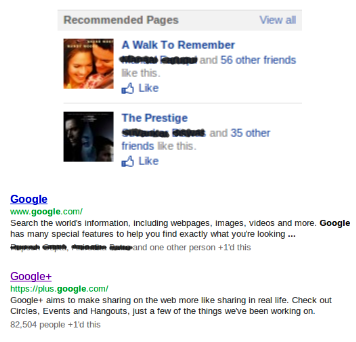Recommendations from your ego network
Recommendations computed from your friends' interests can useful because your friends may have similar interests (homophily) or be able to influence your decision. They are also a practical choice for most websites as social network APIs expose only the friends of a user.
However, it is not clear how useful recommendations from your friends are, compared to those computed from all users' data. Thus, an important question is to know when, in what domains and for which users ego-centric recommendations are useful.
How do recommendations computed from just the ego network compare with those computed using all users' data?
We build recommendation models for music and movie Likes on Facebook and hashtag usage on Twitter. Our findings show that recommendations from the ego network are comparable in precision to recommendations using all users, as shown in the figure below.
More details can be found in our ICWSM 2013 paper.
The Effect of Social Explanations
While showing any kind of information or recommendation, it seems
plausible that showing its connection to our friends will
make it more interesting. Which is probably why, most web companies are in
a scramble to show as much social information as possible. Take a look.

These extra social bits of information thrown at us can be thought of as
explanations for the recommendations. The question then is:
How do social explanations affect the perceived quality of a
recommendation?
Considering that there is concern about privacy violations from such
explanation strategies, it will be good to know beforehand how useful they
are. Measuring this "usefulness" is not trivial, since by defintion it
depends on perceptions of users.
For more details, check our WWW 2013
paper.
